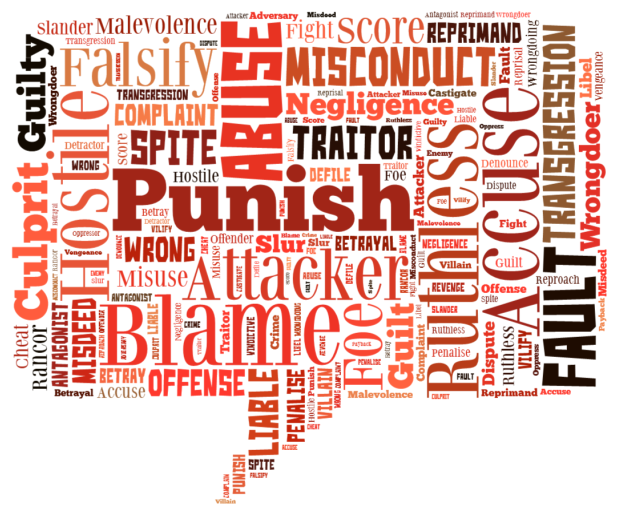Blame is one of the human default emotions. We feel it occur when unforeseen conflict affects our plans or expectations.
Because blame is reflexive it often goes unchallenged: there's no allotted time between the event that triggers it and the blame response for you to question the emotion's usefulness. We go straight to feeling it, expressing it, and sometimes allowing it to shape our behaviour in the form of vindictiveness and revenge. Blame is a fundamental flaw in the human psyche. It can even become such an embedded behaviour pattern that we accept it as an inevitable part of life. But it isn't.
Because blame is reflexive it often goes unchallenged: there's no allotted time between the event that triggers it and the blame response for you to question the emotion's usefulness. We go straight to feeling it, expressing it, and sometimes allowing it to shape our behaviour in the form of vindictiveness and revenge. Blame is a fundamental flaw in the human psyche. It can even become such an embedded behaviour pattern that we accept it as an inevitable part of life. But it isn't.
How Blame Works
- A person forms a plan based on a combination of emotional and rational inputs. Emotional input is the motivator: desire or fear ("to obtain" or "to avoid"). Subject informs the goal. Rational input determines the easiest way to that goal, and is limited by the values (morals, ethics) held. Rational input also evaluates whether the effort of the plan and the reward of the goal are proportionate to warrant action: the reward is sufficiently greater than the effort then the plan is enacted.
- The human now has something to achieve, and takes action to achieve it or to move closer to achieving it.
- When an event happens that disrupts the plan, the process is reset. Effort to reward must be re-evaluated to include surpassing the obstacle: increase of effort, and loss of reward.
- A feeling of loss occurs: the human has had the effort to reward ratio altered unfavourably and is aware of the increase in effort (and proportionate loss of reward) caused by the obstacle.
- Questioning why the obstacle occurred occurs. By understanding it the human may be able to prevent it occurring again and further diminishing the reward to effort ratio.
- If the obstructing event is determined to have been the result of another human's action the feeling of loss is reflexively directed at the actor in the form of ill-will. This sensation is blame.
- Motivated by blame (fear of someone wielding power over them, and the obstacle happening again) the human may lash out: commonly this is done verbally in an attempt to reduce the actor's emotional state to one of guilt or shame in order to manipulate them into not exerting their power to create the plan-disrupting obstacle. This punishment principle is an ancient form of social conditioning used in an attempt to influence others and minimise others' influence over them.
- The flaw of the blame/punishment system is its low efficacy. This is the weakness of blame. Instead of attempting to punish others for real or imagined personal transgressions it's more effective to communicate ones plans to the actor and pursue them in cooperation.
Even if cooperation is impossible, by avoiding the blame/punishment method the possibility still exists of achieving an agreement of mutual understanding and non-hostility that would be impossible to achieve once punitive action has been taken motivated by a blame state.
Dealing with Blame
To change a behaviour, you first need to be aware of it. A simple blame-detection technique is to listen for words like these:
Image copyright Tagxedo.com 2015
This type of language indicates a blame response in the speaker (or the thinker). Once you start blaming, it's not too late! You can prevent blame-motivated punitive action being taken by asking these questions:
This directs thinking back to goal attainment, which is the thing that matters most. Getting what you wanted when you were thinking clearly should always be priority 1! So keep it that way. Ask yourself the questions, and act on them.
Note that words like "Responsibility" and "Accountability," which are completely distinct concepts from blame, are sometimes used to conceal actions motivated by blame. If you or anyone you know masks language in this way, be aware of those words too to ensure you're aware of blame whenever plans become disrupted.
- What can I do that will bring me closer to my goal?
- What if I told the person I'm blaming what my goal is, and asked for their help?
- What if I helped this person with their goal in exchange for them helping me achieve mine?
This directs thinking back to goal attainment, which is the thing that matters most. Getting what you wanted when you were thinking clearly should always be priority 1! So keep it that way. Ask yourself the questions, and act on them.
Note that words like "Responsibility" and "Accountability," which are completely distinct concepts from blame, are sometimes used to conceal actions motivated by blame. If you or anyone you know masks language in this way, be aware of those words too to ensure you're aware of blame whenever plans become disrupted.


 RSS Feed
RSS Feed
